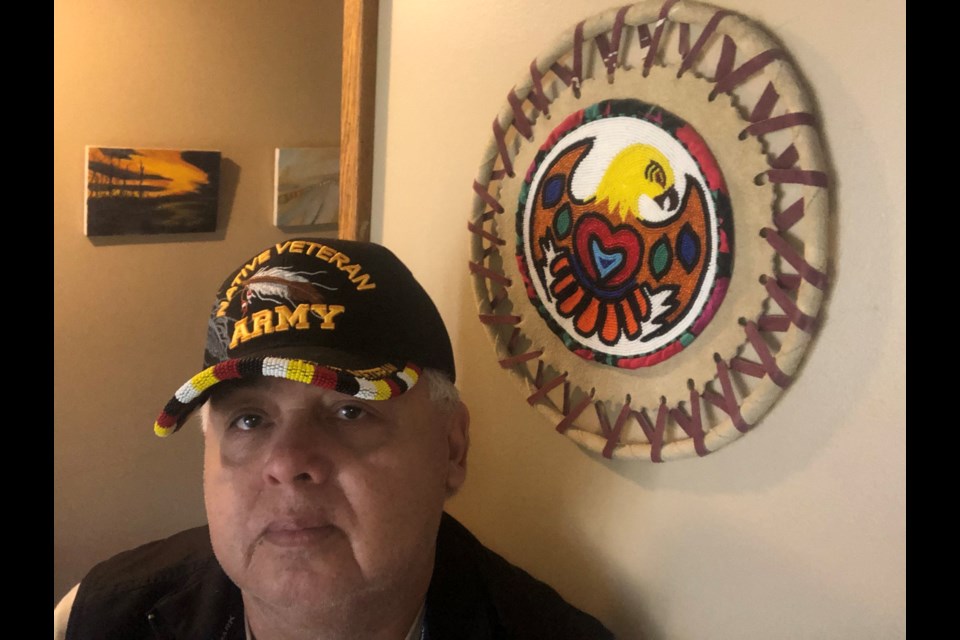Local elder and former Beausoleil Island First Nation Chief Jeff Monague served with the Royal Canadian Horse Artillery’s first and second regiment during the Cold War in the 1980s.
After completing his basic military training, Monague spent six years in Germany, from 1981 to 1987, where he remembers being in the midst of geopolitical tensions between the Soviet Union and the United States alongside their respective allies.
“I remember we would go on NATO exercises and we were constantly being followed by Soviet operatives," recalled Monague. "When we observed them following us, which we often did, they would intercept our communications and play games with us all the time."
Thankfully, Monague never had to engage in combat with the enemy, however, he remembers being a part of some dangerous assignments.
“We did lose people along the way through different accidents. There were a lot of occasions where we prepared to go to war and you didn’t know if it was going to happen or not, and we had to deal with a terrorist threat that was happening at the time,” Monague said.
“I remember being on the base defence force, patrolling the base at night because there were people who were looking to bomb us and they did bomb a few of our vehicles," said Monague.
"They were very testy times in the sense that if anybody made a mistake, then the next world war would start. We all understood that, and were told to be as disciplined as possible," he said.
Monague says his time serving in the military has had a lasting impact. Even today, almost 40 years later, Monague still feels a personal and mental unrest tied to those stressful, dangerous times.
The reason Monague pursued joining the military goes all the way back to the War of 1812 when his First Nations ancestors served with the United Kingdom and its allies.
Monague’s bloodlines include a long military history. His father was a Korean War veteran and eventually became one of the first First Nation Constables in Canada under the RCMP’s special constable program.
Monague has two younger brothers who also served with the Canadian Military, and he is also a Christian Island native which, he notes with pride, had the highest ratio of serving members as a community than anywhere else in Canada.
“I enjoyed serving for our country and for our people. I always knew that I was serving as an Ojibway person and as an Anishinaabe and I was serving as an ally of Canada just as my ancestors did,” Monague said with great pride.
Unfortunately, despite Monague’s unselfish service and his deep military family background, he and many other First Nations soldiers faced a lot of disrespect and racism during their time in the military.
“In basic training, I would be called every name under the sun, which was normal for sergeants to do,” Monague said.
“They would say racist things to me, they would call me a 'stupid drunken Indian' without any proof of that, those types of things happened all the time which wouldn’t be allowed today," he said.
Despite the verbal abuse, Monague says he did his best to not let the racism affect him. He had to stay focused on doing his job, he says, which was protecting his country, community, and family.
Today, Monague serves as an elder to Canadian Forces Base Borden where he makes sure that young Canadian Indigenous soldiers are not facing any sort of racism and are being treated with respect.
Despite being treated poorly at times because of his race and culture, Monague says sometimes First Nations soldiers were called upon to get jobs done that the typical soldier wouldn’t necessarily have the skills to do.
“We had different skills that we brought to the game. We understood the bush and knew how to operate in the bush a lot better than most people did,” Monague said.
“That comes from growing up in remote communities like Christian Island," he explained. "I got to know from my father how to operate in the bush, how to hunt, how to navigate, how to do different things that we were expected to know. There were things I could teach people that weren’t included in our regular military training.”
Monague says his experiences in the military and being overseas in a time of global tension shaped him into the man he is today - a man who served as a chief for a First Nations community, and, for many years, has been an educator.
“I got a lot of leadership training when I was there and I worked through the ranks. Eventually I looked after anywhere from five to 30 soldiers at a time," said Monague.
"I have a lot of experience working with people so making that transition wasn’t that difficult at all,” he said.
“I learned to teach recruits when I was in the military and that’s a skill that I was able to transfer to my civilian life and I still enjoy doing that. I still enjoy teaching," he said.
Monague now resides in the Coldwater area, and although local Remembrance Day ceremonies may be different this year, he encourages folks to take time to honour and remember all Canadian service members from past and present.
He also encourages people to honour Indigenous service members who many have forgotten about.
“Even though across the country we had a higher ratio of servicemen then any other ethnic group, we didn’t receive the same kind of welcome back home. Many soldiers ended up in awful situations because they didn’t receive the same kind of benefits as other Canadian soldiers,” Monague explained.
“Many of the men who enlisted lost their status as Indians in Canada. It wasn’t fair, it’s never really been fair," he said.



